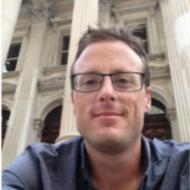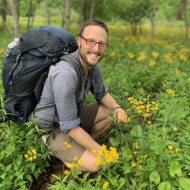What does life look for you now?
When I stop to think about it, my life is pretty interesting and I have been lucky that my love for biology has taken me to some amazing places. Currently (2016-2017) I am based at the Smithsonian Institution in Washington DC where I research the role that climate, geography, and geochemistry play in driving plant speciation in North America - why are there so many dasies, and why do they live where they do?? Working in a museum was an unexpected opportunity - the pleasures of research without the distractions of teaching - and collaborating with some of the best minds in the world is incredibly stimulating. Being located in the center of Washington DC is also somewhat surreal and living in a large city is constantly entertaining, even exhausting, so I am fortunate that my work allows me to travel semi-regularly to other cities for conferences, or across large swathes of the US collecting plants. This is a marked contrast to my previous postdoctoral assignment in Rochester (Upstate New York) a battling rust-belt city where my life revolved around long hours in a lab sorting flies by eye colour to identify the genes responsible for sterility between species.
The pressures of trying to pursue an early career in academia (especially in the current political climate) are intense, with stress and a nomadic lifestyle making a full personal life difficult. However I have been given many wonderful opportunities and have resolved to take the time to explore and experience as much of my surroundings as I can while I have the chance.
Tell us what you are passionate about?
Work is my passion, or maybe more correctly, my passion is my work. I have always been fascinated by the natural world, and the diversity and industriousness of all the living things that you can see just by sitting quietly on a log and observing. My job allows me to ask bigger questions of these observations, the whys and hows of where life has come from, and what makes it look, live, and interact the way it does. This fits naturally with a love for the outdoors and I enjoy frequent hikes and camping trips.My other passions are somewhat detrimental to my work. Living in the US has opened up an astonishing world of craft beer, and seeking out small breweries and niche bars has given me an excuse to explore all corners of cities and be way-layed by small towns across country. Somehow, despite this, I am also still managing to keep mind and body together enough to play Aussie Rules for the Baltimore-Washington Eagles. There is no equivalent feeling to the camaraderie you develop with your teammates.
When you were young, what were you hoping to be when you grew up?
There was never any doubt that I was going to be a scientist, however even though my father is also a biologist I had no realistic concept of what a research career actually entailed. I never sat down and planned the steps, or was even cognizant of working strategically towards a particular goal. I knew what I wanted to do and just did it, and somehow have managed to string enough luck and opportunities together to wander into the start of an academic career.
How easy was it to decide what to do in life?
For better or for worse I never really had to decide, and have been fortunate to be able to translate what I love doing - asking questions of the world around me - into a career. My marks in college allowed me to go to ANU, which was convenient, and had an exceptional biology department. From there I followed the advice and nudging of colleagues and mentors along a fairly well-trodden path to a PhD.
Deciding on whether to move overseas and what jobs to consider after that was more challenging, and it is still unclear whether I have made the right decisions in what areas of work I am focusing on, and which skills I am specialising in. In some ways I am envious of people who were unsure of a career and discovered something to be passionate about at university, or in life after college. The excitement and drive that comes from finding a vocation later in life is exciting to watch, however I hope that as long as my work continues to challenge and surprise me, I will be able to continue to discover the little bubbles of passion that keep me going.
In hindsight I probably should have thought more critically about whether I did indeed want to pursue a higher degree, and I have seen many friends struggle with stress and disillusionment both during and after their graduate careers. Dedicating oneself to years of study is rewarding, but is also a huge investment in time that can delay the start of an alternative career. On balance I think it was the right thing for me, however I am still in the early stages of my professional path and many difficult decisions are still ahead.
Did your further study or career go exactly as you'd planned?
Looking back so far it appears that I had a plan, but it was more a series of lucky opportunities, in fact I very nearly didn't graduate my degree. By the end of my third year I had completed all but one unit required to graduate and had done all the work bar one assignment, registering it as "did not finish." I was burned out and overwhelmed. Thankfully my biology professor wanted me to do honours with him and contacted a family friend who suggested that I should approach the lecturer for the remaining unit. He graciously agreed to accept the assignment months late and my degree was completed, allowing me to begin an honours degree the next semester. I went on to do a PhD and start a career, that from the outside, looks methodical and planned. So much can hinge on small acts and luck.
What advice do you have for current students?
Ask questions. It is a very useful habit that will save you a lot of time and embarrassment in the future. Also, show your enthusiasm for the things that you enjoy. If people know you are excited by something, they will do a lot to help you achieve it.


